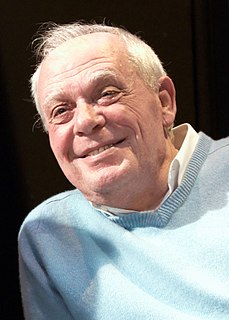A Quote by Antonio Lobo Antunes
Whenever anyone declares having read a book of mine I am disappointed by the error. That’s because my books are not to be read in the sense usually called reading: the only way it seems to me to approach the novels that I write is to catch them in the same manner that one catches an illness.
Related Quotes
If you are going to write, say, fantasy - stop reading fantasy. You've already read too much. Read other things; read westerns, read history, read anything that seems interesting, because if you only read fantasy and then you start to write fantasy, all you're going to do is recycle the same old stuff and move it around a bit.
There is only one way to read, which is to browse in libraries and bookshops, picking up books that attract you, reading only those, dropping them when they bore you, skipping the parts that drag-and never, never reading anything because you feel you ought, or because it is part of a trend or a movement. Remember that the book which bores you when you are twenty or thirty will open doors for you when you are forty or fifty-and vise versa. Don’t read a book out of its right time for you.
If you are resolutely determined to make a lawyer of yourself, the thing is more than half done already. It is but a small matter whether you read with anyone or not. I did not read with anyone. Get the books, and read and study them till you understand them in their principal features; and that is the main thing. It is of no consequence to be in a large town while you are reading. I read at New Salem, which never had three hundred people living in it. The books, and your capacity for understanding them, are just the same in all places.
I read continually and don't understand writers who say they don't read while working on a book. For a start, a book takes me about two years to write, so there's no way I am depriving myself of reading during that time. Another thing is that reading other writers is continually inspiring - reading great writers reminds you how hard you have to work.
I want my books to exist in the literary world, not only in the art world. I am interested in having a dialogue with other writers, and the readers of those writers. Someone who is reading a book of mine might not have visited my exhibitions related to it, but can still have a full, literary experience with that book. This would be a completely different experience from stepping into the show, not having read the book. One form is not illustrative of the other.
You can't write a book if you've never read a book. And if you've read five books and you try to write a book, your book will mainly encompass the themes and the context of the five books you've read. Now, the more books you read, the more you can bring to a book when you decide to write one. So the more rap I learned, the more I was able to bring to rap when I decided to rap. But this was all subconscious.






































